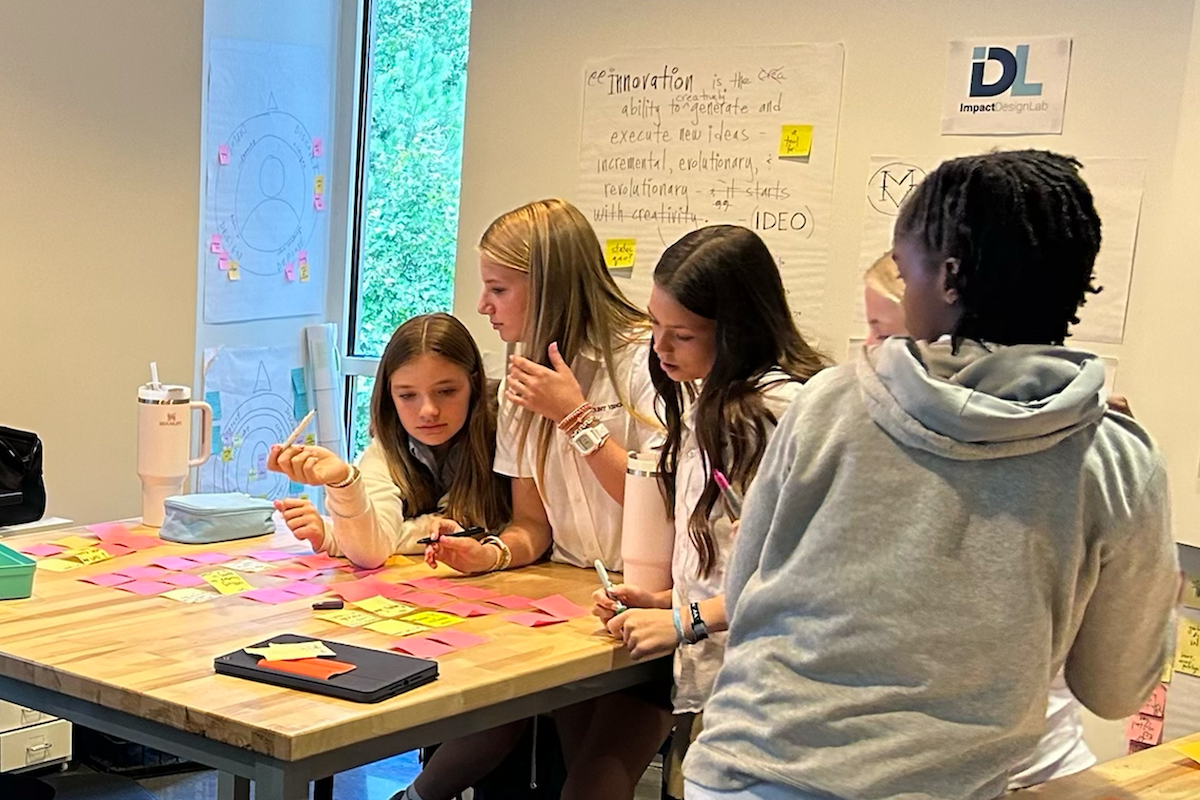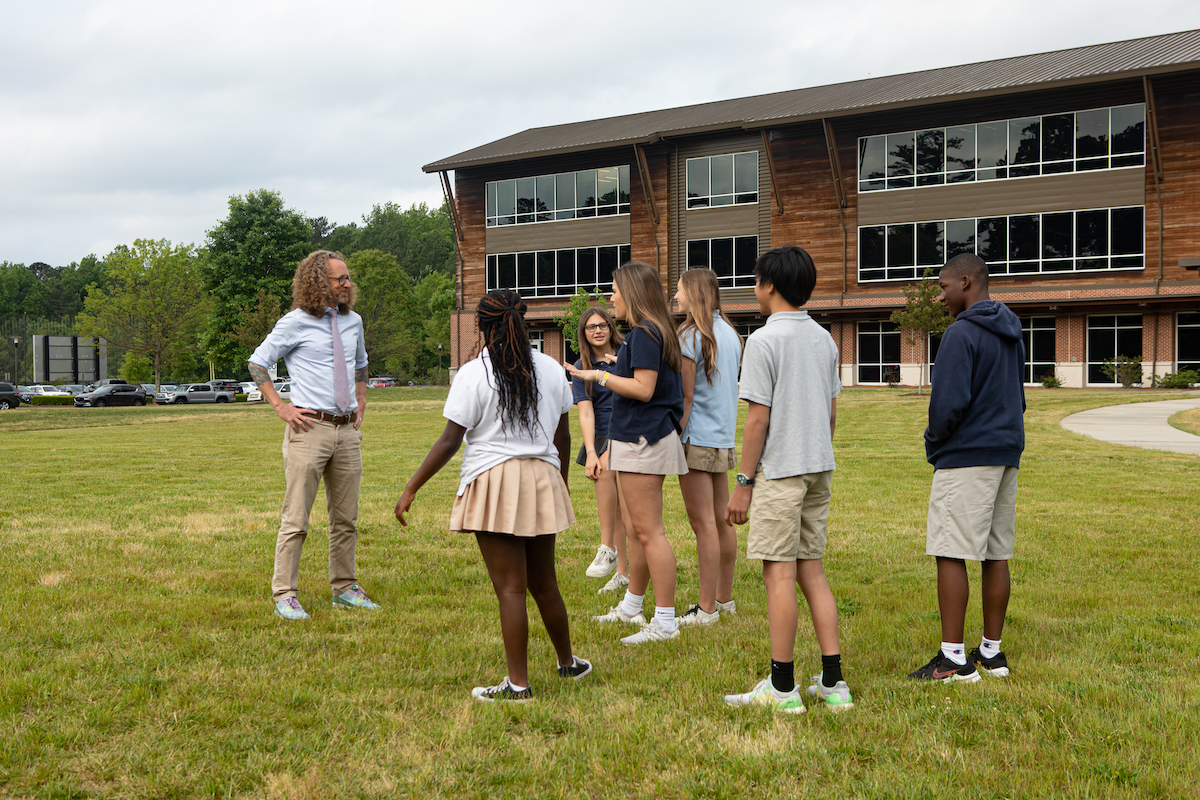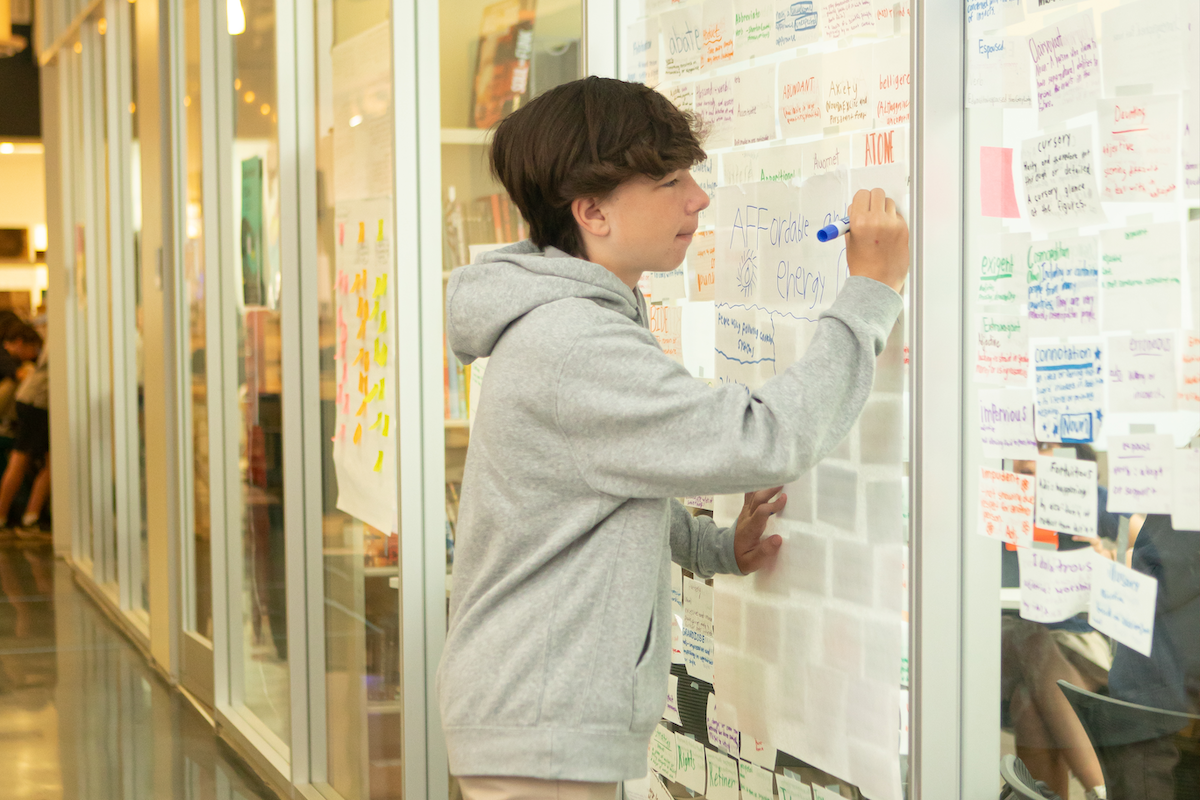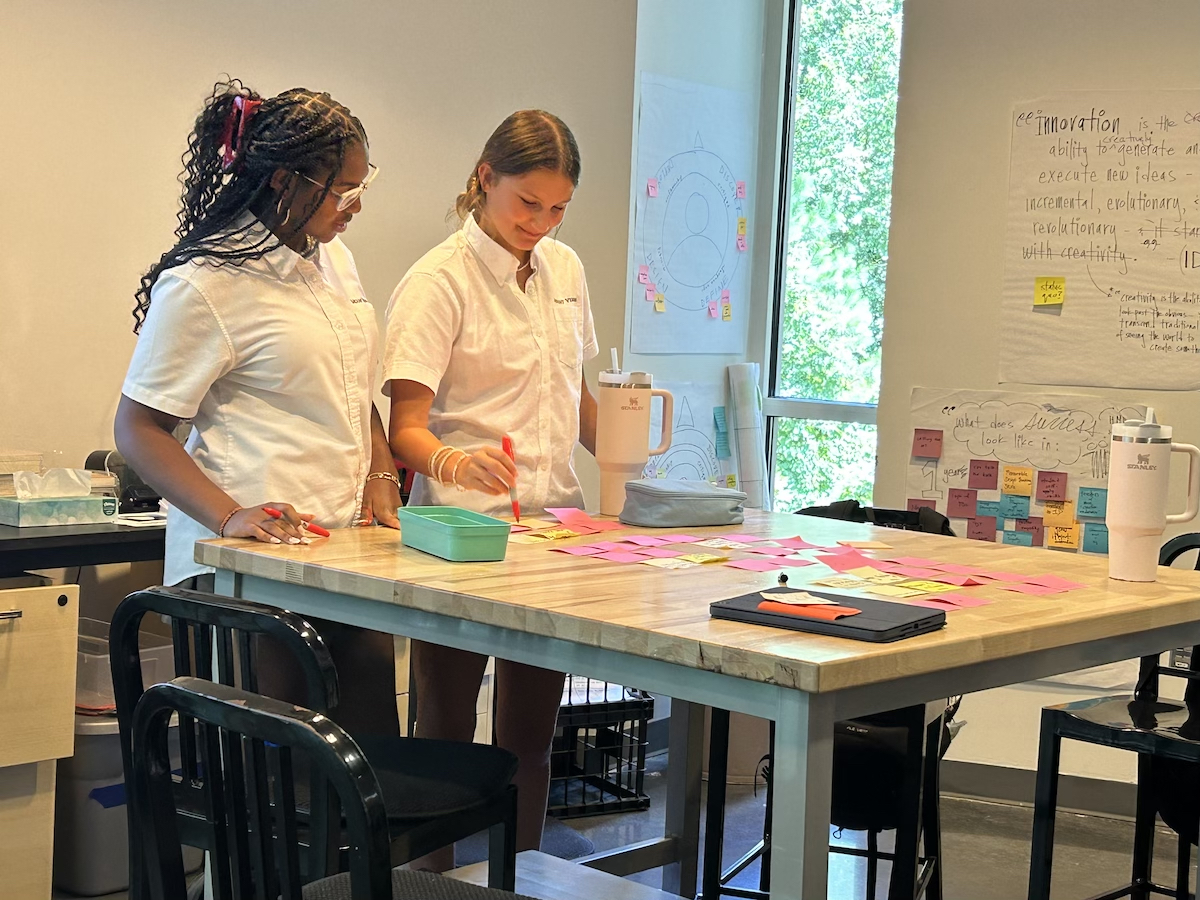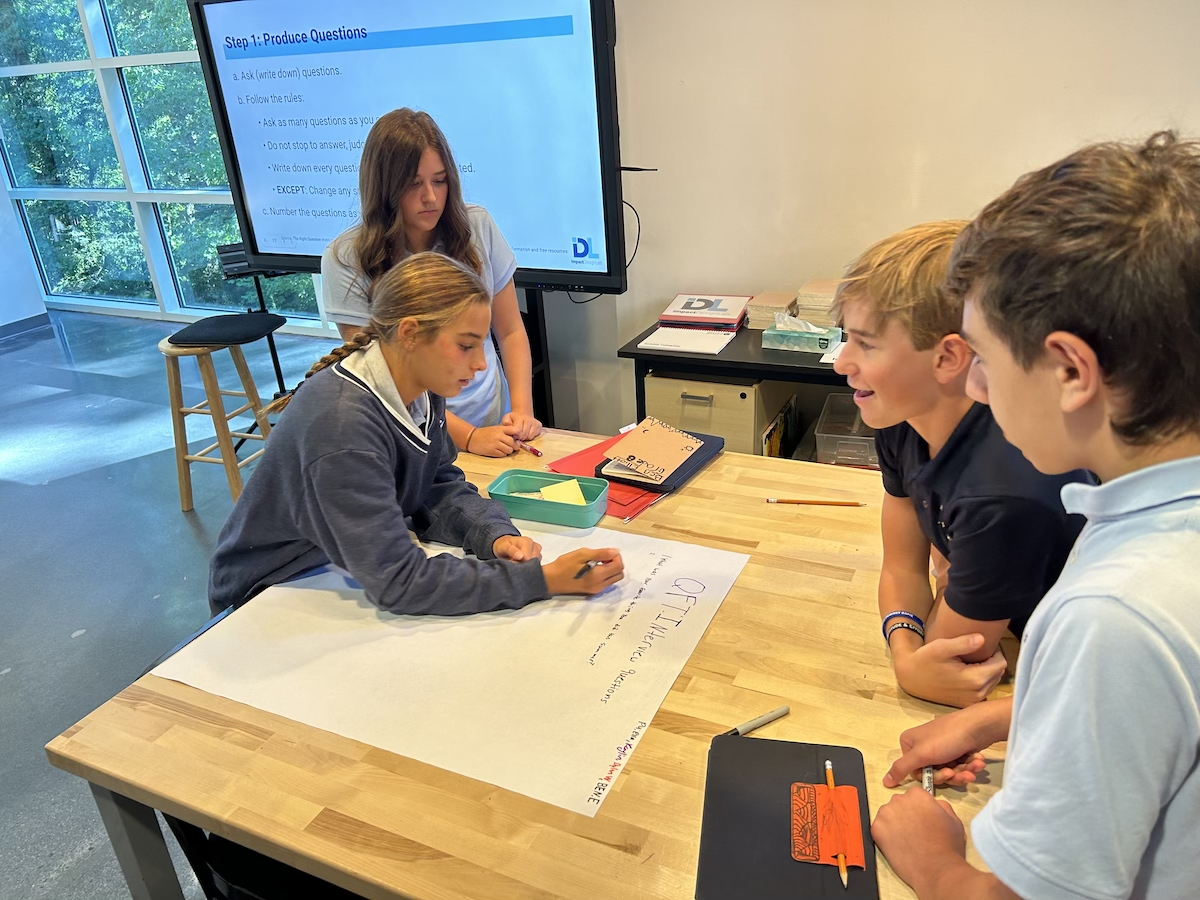An Interview with the Designers of the Impact Design Lab
“Education is not the learning of facts, but the training of the mind to think.” – Albert Einstein
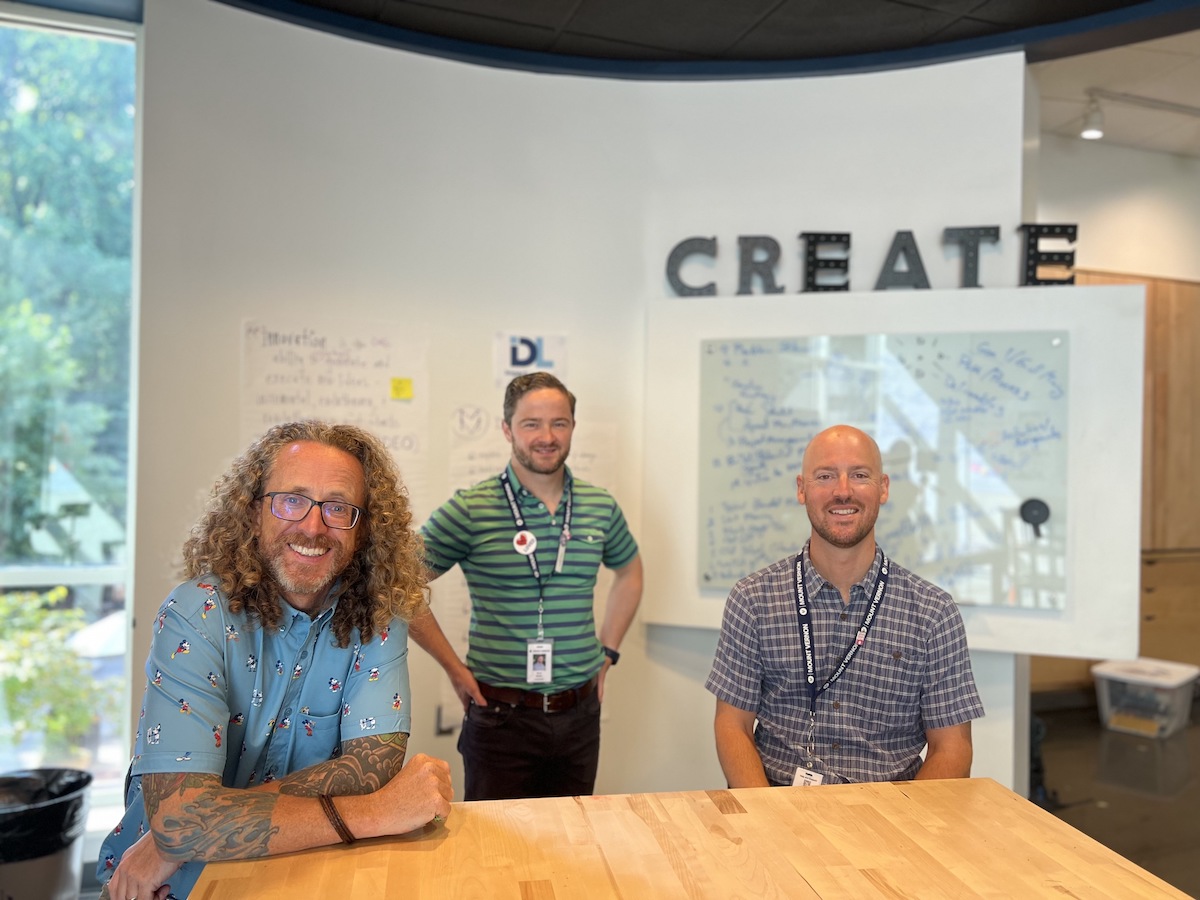
We sat down for an insightful conversation with the three educational designers innovating the way students learn in the Middle School. We dove deep into how Impact Design Lab (IDL) is systematically building agency among Middle School students.
Let’s start with a quick recap, for those who might not know…What is IDL?
Ryan Welch: Impact Design Lab is a yearlong course that all Eighth Grade students take. We are trying to return the curiosity of learning to learners, but also equip them with the agency to tackle whatever projects may come their way both this year and in the years to come – whether that’s here at Mount Vernon, or out in the world.
Can you share a little bit about learning walks? Why are they important?
Kevin Day: I like to get outside. My hunch is that Middle Schoolers like to get outside. So to me, it is a built-in brain break. There’s also a kinesthetic piece: some folks learn when they’re in motion, or ideas come to them when they’re in motion. When our kids get to walk and talk, they also have a little more open space in which to get connected.
Todd Wass: Many of the skills we’re building in IDL (like scheduling, interviewing, observation, sketchnoting, and presentation skills) require us to get outside of the classroom to practice them. While it is great to read about them – maybe see some videos, see some social media about how helpful these skills are – if we’re not outside practicing day to day, our students are not internalizing how helpful they can be. There are really powerful moments when we get outside of the classroom to practice these skills.
Ryan Welch: We’re also really intentional with the structure we offer, whether it is a ‘walk and talk’ or observation, journaling or sketchnoting. Students may not have ever learned these skills. We are introducing them in bite-sized ways that they can piece together. We hope it helps them ask critical questions, like “Why?”, or “Why did we do this?”, or “Where does this go?” For example, the structure of the QFT (question formulation technique) helps students to ask good questions – which is where real inquiry lies.
We want to take learning outside our walls. We don’t want it to just happen in the Hive or in Mr. Song’s room. We want learning to happen at ALL times. If we help build up their observation skills, the next time they ride Marta or go to Hartsfield-Jackson or visit Trader Joe’s or Kroger, they will be observing and it will lead to insights that could lead them to being agents of positive change in their world. We want to take this territorialized view of where learning can happen and flip it because learning can happen everywhere.
In our new strategic plan, The Impact Ready Project the term ‘impact ready’ is defined as the agency to explore, discover, and act on what is meaningful to self and consequential to others. How does IDL embody impact readiness for middle school age students?
Ryan Welch: Impact Design Lab is a bridge between iProject Mini in the Lower School and either iProject or Innovation Diploma (iD) in the Upper School. What makes it so timely for Middle School students is the fact that, developmentally, Middle School students are very much in their own heads. Their ego starts to become what it is and they’re looking at themselves in the community of their particular class and grade. IDL takes them out of that headspace and helps make them more aware of the fact that they are also in community with Sandy Springs, Georgia, the United States, and the world, right at a time when they are egocentric due to natural human development. IDL helps to make them more aware so that they can move to that next developmental phase of where they can see themselves operating as a part of a community.
During our interview, the group elaborated on the notion of being “impact ready.” They emphasized that it entails more than just acquiring knowledge; it involves the ability to think critically, identify problems, and develop creative solutions.
Can you share an example of work IDL students participated in and some of the outcomes?
Todd Wass: Last spring, IDL students designed the field game portion of Mustang Rally ‘23. Given the way our schedule works, the entire process took about six weeks. During the design process, IDL students spent time on Lower Campus talking with Lower School students and faculty. Some of the feedback was brilliant and would not have been considered had they not gone across the street to interview them. They then started to brainstorm ideas. A grand list was created by each section. As we began to prototype ideas, it was not us, but the students, asking, “Can we do this with 1200 students? Is this possible? Oh, maybe we need to rethink all of this.”
There were kids already thinking, “How might we involve the Upper School students?” They then reached out to their networks to engage Upper School students to help them record videos. This was something we did not set up, that they organized themselves. There were some really great moments of IDL students taking agency saying, “Here’s what we need to do. We’ve got these tutorials that we’re gonna get to the Lower School kids so they will know what games they’re going to play and how to play them.” There was a brilliant moment where a group created a beautiful video. We all watched it because we were giving feedback. And it clicked. The kids said, ”There’s our minimum viable product. That is the tutorial video! We need to go outside. Now. Let’s go redo the rest of them. Because this is what we need. This is where we need to be.”
Ryan Welch: In that moment it ceased becoming “Is this what you want Dr. Wass? Is this what you want Mr. Day?” It became, how can we make this video like the one we saw? Some of those tutorial videos make me smile. They just have flow, and they were highly instructive. And the kids completely did it from script to recording to editing. And they shipped it out.
Todd Wass: They recognized they weren’t creating it for themselves.They were creating it for a group of younger people who needed to know how to play these games, so that they felt included, and they were engaged during this time during Mustang Rally. Which goes back to the question that they came up with and drove their design process which was…How might we create a more engaging Mustang Rally experience for everyone?
How does personalization factor into IDL?
Ryan Welch: The whole process of design thinking is not just this pat response to a problem. You have to really get to know your “users” (the people for whom you mean to support and work with on their terms) to solve for them. We have a whole new group of users this year. We actually have a whole new group of users every day. What may have worked on Monday in our section might not work today because maybe we have this afternoon section and they need to go have a walk and talk.
We say “relationships are foundational”, and I think it really applies here. We have to really know the learners in our room to design for them. And the opposite is true. Kids need to learn their instructors in a way that allows them to open up so that they can bring their full selves into the process.
Kevin Day: I look back on my own journey through school, and I got so good at assignments. But I had no idea when it was time for you to make a decision, or figure out what I wanted, what I was interested in. I’d be looking for someone to give me that assignment. And so I’m hoping that part of the agency piece is kids feeling invited into their own learning in ways that I wasn’t able to do myself.
Ryan Welch: It’s also the elimination of school as a system to be gamed. We don’t want that to be the case for our learners. We want them to GAIN from this instead of GAME it and then be able to take these skills and apply it to their lives in an authentic way. Instead of them waiting for a teacher to tell them what to do or where to go. They will have the skills for impactful design.
Want more IDL? Follow them on Twitter.
